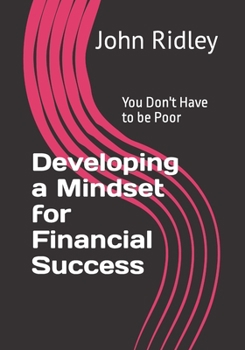Developing a Mindset for Financial Success: You Don't Have to be Poor
Money has been on the minds of most throughout the centuries. Insufficient money for basic needs is a struggle for many. Every economy of the world operates on some form of money, except where a barter system thrives. A global economy uses the US dollar as the leading currency and actions by one country affects others, down to individual personal finances. The poor and the middle classes must handle money wisely to avoid sinking farther into poverty and taking steps to improve their financial situation. Simultaneously, the wealthy spend their energy on various strategies and investments. Regardless of the amount of money, both the rich and the poor must invest much thought and creativity in order to prosper. There are examples of those with great wealth who ended up paupers and others exist where poor or middle class individuals make prudent choices, and may become rich or wealthy. This book provides a background in basic economics with examples of failures in properly managing life, which requires the handling of money. Students should learn basic economic facts early in life, practicing good habits to aid them in avoiding mistakes by their parents, leading to poverty. Certain conditions that affect one's financial condition can be taught. These lessons should be the responsibility of parents and schools. Much can be learned from religious scriptures, where prophets, kings and leaders frequently spoke of the wisdom of fiscal prudence. Examples of failure of past and present are provided. Many rich people start out poor, giving them incentive to escape the shackles of poverty. Some rich families quickly and easily became poor due to easily avoided mistakes. The wealthy and dependents of government assistance often do not value what they receive without effort. When contrasting the poor, those in poverty and the wealthy, certain distinctions arise. The poor may have a choice to escape poverty. But some, complacent and comfortable, are dissatisfied with the amount received from government aid. The rich and wealthy may also fail to realize that money will vanish if not handled prudently. Today half the US population relies on some form(s) of public assistance. The US is a country of freedom, but many lack the initiative or knowledge to rise above a subsistence level. Becoming wealthy is not a matter of luck Distinctions exist between those in "poverty "and the "poor." Poverty, mental state without hope, is a survivalist attitude difficult to eradicate. Many in poverty believe fate prevents success, but is often a result of choices. Some refuse low wage jobs, opting for government assistance. Others accept low-wage jobs, knowing poverty is not as a chronic condition. A lack of willpower, desire and a defeatist attitude often prevents financial advancement. Sadly, 50 million Americans struggle with poverty with no signs of progress. Others see minimum wage jobs as temporary while seeking education and training toward increased income. They have faith a better day is coming.Some interesting facts: 1 out of 7 persons in 2020 is a millionaire To become wealthy, many worked up to 70 hours weekly. Being rich can be a very good thing when approached in the right manner, but for some it brings out greed. Government aid stifles personal initiative for some. Restrictions regulating the money in circulation are required to prevent the crash of the country's economic system as increases in circulation bring inflation so printing more money is no option It was once said, "a democracy is in trouble when its citizens believe they can legislate themselves a living. Ironically the US may encourage poverty by providing aid rather than encouraging more creative approaches. Easy credit for training students at risk result in heavy student debt. No one rises from being poor if dependent upon the government to meet basic needs of family or individual The parent leaving his son enormous wealth deadens the talents and energy
Format:Paperback
Language:English
ISBN:B089M2J7BB
ISBN13:9798651285587
Release Date:June 2020
Publisher:Independently Published
Length:232 Pages
Weight:0.90 lbs.
Dimensions:0.5" x 7.0" x 10.0"
Customer Reviews
0 rating





